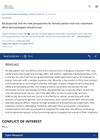Bicalutamide
Bicalutamide is a medication primarily used as an antiandrogen therapy for prostate cancer treatment. It belongs to the class of drugs known as nonsteroidal antiandrogens. Bicalutamide works by selectively blocking androgen receptors, which prevents the action of androgens, such as testosterone and dihydrotestosterone (DHT). These hormones are crucial in the development and progression of prostate cancer, as they can stimulate the growth of cancerous cells in the prostate gland.
The mechanism of action of bicalutamide involves competitive inhibition at the androgen receptor level. By binding to these receptors, it effectively blocks the interaction of androgens with their target receptors on prostate cancer cells. This inhibition reduces the growth-stimulating effects of androgens on these cells, thereby slowing down or stopping the progression of the cancer.
In addition to its primary use in prostate cancer, bicalutamide's antiandrogenic properties have led to its exploration in other conditions influenced by androgens, such as hair loss in women (female pattern hair loss or FPHL) and hirsutism. In these conditions, the excessive action of androgens can lead to unwanted hair loss or growth, and bicalutamide’s ability to block androgen receptors can be therapeutically beneficial.
Bicalutamide is typically administered orally and is known for its high binding affinity to androgen receptors, making it an effective option in conditions where androgen suppression is desired. Its nonsteroidal nature distinguishes it from other types of antiandrogens and contributes to its safety profile and efficacy in treating conditions related to androgen excess or sensitivity.
The interest in bicalutamide for hair loss treatment stems from its ability to antagonize the effects of androgens on hair follicles. In conditions like FPHL, androgens can lead to the miniaturization of hair follicles and subsequent hair thinning. By mitigating this androgenic activity, bicalutamide may help prevent the progression of hair loss and potentially encourage hair regrowth.
Research on bicalutamide for hair loss has focused on its effectiveness and safety profile. Studies have explored its use in women with FPHL, assessing its impact on hair density and overall hair health. Results indicate that bicalutamide can improve hair loss symptoms with a good safety profile, making it a promising treatment option for FPHL. Some studies have also examined its use in combination with other treatments, like minoxidil, to enhance hair regrowth.
In the community, discussions about bicalutamide often revolve around its effectiveness in treating FPHL, comparisons with other antiandrogen treatments, and personal experiences with the medication. Users share their outcomes, noting improvements in hair density and overall hair health, while also considering potential side effects and long-term safety.
In summary, bicalutamide is emerging as a potential treatment for hair loss, particularly in women with FPHL. Its role as an antiandrogen provides a targeted approach to addressing hair loss linked to hormonal factors. While research supports its use and points to a favorable safety profile, community experiences and opinions vary, underscoring the need for more extensive studies to fully establish bicalutamide's role in hair loss management.
Research
20 / 333 results
research Combined Oral Contraception and Bicalutamide in Polycystic Ovary Syndrome and Severe Hirsutism: A Double-Blind Randomized Controlled Trial

research Optimization, Characterization, and Follicular Targeting Assessment of Tretinoin and Bicalutamide Loaded Niosomes

research Safety of Oral Bicalutamide in Female Pattern Hair Loss: A Retrospective Review of 316 Patients

research Bicalutamide: A Potential New Oral Antiandrogenic Drug for Female Pattern Hair Loss

research Oral Bicalutamide for Female Pattern Hair Loss: A Pilot Study
research Bicalutamide Improves Minoxidil-Induced Hypertrichosis in Female Pattern Hair Loss: A Retrospective Review of 35 Patients

research Bicalutamide and the New Perspectives for Female Pattern Hair Loss Treatment: What Dermatologists Should Know
research Comment on Bicalutamide Improves Minoxidil-Induced Hypertrichosis in Female Pattern Hair Loss: A Retrospective Review of 35 Patients
research Phase I-II Trial of Weekly Bicalutamide in Men with High PSA and Negative Biopsy

research Do Finasteride And Bicalutamide Affect Blood Glucose Levels In Diabetics?

research Do Finasteride And Bicalutamide Affect Blood Glucose Levels In Diabetics?
research RF-Mesotherapy With Bicalutamide: A Novel Alternative For Androgenetic Alopecia
research Improvement of Female Pattern Hair Loss with Bicalutamide: A Time-Dependent Process
research Response to Improvement of Female Pattern Hair Loss with Bicalutamide: A Time-Dependent Process
research Highlights From JAAD Reviews: August 2025—Bicalutamide for Female Hair Loss
research Enhanced Ex Vivo Skin Retention of Bicalutamide Using a Nano-in-Micro Composite: Drug-Loaded Lipid Vesicles in a Dissolving Microarray Patch

research Efficacy and Safety of Bicalutamide in Female Hair Loss: A Review of the Literature

research Combination of Oral Minoxidil and Bicalutamide for the Treatment of Female Pattern Hair Loss in Adolescents

research Bicalutamide 25 Mg Associated With Minoxidil 1 Mg Versus Minoxidil 1 Mg for Female-Pattern Hair Loss: A Randomized Double-Blind Clinical Trial
